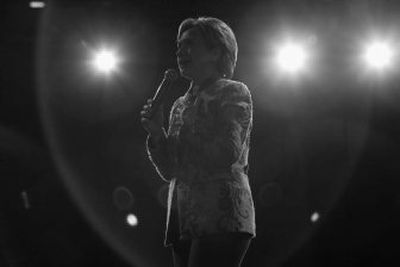Rivals court cash now, hoping for votes later

WASHINGTON – Presidential candidates are collecting contributions at a record-setting pace and are racing to load their schedules with fundraising events ahead of March 31, the campaign’s cutoff for financial reports that will be filed next month.
The amounts that contenders can bring in will shape the narrative of the race for months to come – potentially vaulting a candidate into the top tier – and could spell an early exit for some.
Fundraising professionals say they expect the candidates to greatly exceed totals from previous cycles, perhaps by hundreds of millions of dollars.
Sen. Hillary Rodham Clinton, D-N.Y., for example, mingled with about a thousand donors Tuesday night at the Marriott Wardman Park Hotel for her campaign’s second million-dollar-plus fundraiser in three days.
It is not simply Clinton’s outsize fundraising power driving the vacuum-cleaner mentality. A confluence of other factors – including voter dissatisfaction with the Bush administration, wide-open fields in both parties, higher donation caps and a rush by large states such as California and Texas to move their primaries to the front of the nominating process – has compelled campaigns to establish virtually round-the-clock fundraising schedules, with candidates and surrogates participating in sometimes a dozen events or more in a day. Not a single day in March will pass without at least one 2008 contender personally making a major push for funds.
The result: More than a year and a half before the election, the collective field could match in a single quarter the nearly $100 million that George W. Bush raised during his record-breaking primary effort two presidential cycles ago.
“It’s almost a geometric increase,” said Michael Toner, who left his post as a member of the Federal Election Commission last week.
Campaigns are also aggressively trying to manage expectations, providing low-ball estimates of what they will raise while exaggerating predictions for their opponents. Estimates of what Clinton will raise this quarter range from $15 million (the official prediction of the campaign, which one of her own aides privately concedes is low) to $50 million (a staggering and probably unrealistic figure).
Sen. Barack Obama, D-Ill., has similarly played down his goals, with aides saying they would be thrilled with a take of $7 million to $12 million this quarter. But there is ample evidence – such as Obama’s raising $1.3 million at a single Hollywood event – to suggest that he could do better, perhaps hitting $20 million or higher.
One of the great unknowns is how former senator John Edwards, D-N.C., will fare. Clinton and Obama (as well as Republicans John McCain, of Arizona, and Sam Brownback, of Kansas) must pay at least some attention to their positions in the Senate, but Edwards is unencumbered by a day job and is still riding his popularity as the vice presidential nominee in 2004. He has by all accounts been on a furious, if quiet, fundraising tear, hoping to at least match the $7.4 million he raised in the first quarter of 2003 – a number that at the time led all contenders and vaulted him into serious contention.
For Edwards and other Democrats seeking to catch up with Clinton and Obama – such as Sen. Christopher Dodd, of Connecticut, Sen. Joe Biden, of Delaware, and New Mexico Gov. Bill Richardson – the money flow, or lack thereof, could produce a moment of reckoning.
“It’s a contest of elimination,” said Fred Baron, Edwards’ national finance chair. “If a candidate can’t raise the money, it bodes poorly for that candidate and might cause them to rethink their candidacy.”
In a significant change, strategists on both sides of the aisle agree, Democratic contenders could wind up with more money than their Republican counterparts.
Still, GOP benchmarks exist. The campaigns of former New York mayor Rudolph Giuliani and former Massachusetts governor Mitt Romney have said publicly that they hope to collect $75 million to $100 million by the end of the year.
Early on, Romney impressed insiders by collecting more than $6 million in a single call-athon day in Boston, but one strategist said he has not heard much since from the former governor. “Either he’s gotten all the money he’s going to get or they’ve got so much money they don’t need any more,” the strategist said. Romney is staying active on the fundraising circuit, with 20 events scheduled this month.
Giuliani may have the most to gain – or lose – with his first-quarter showing, and he and his inner circle of fundraisers are acting like it. One Republican operative said that Paul Singer, a pioneer in hedge-fund investing and a Giuliani backer, is personally making calls to potential donors, putting his own capital on the line to round up cash.